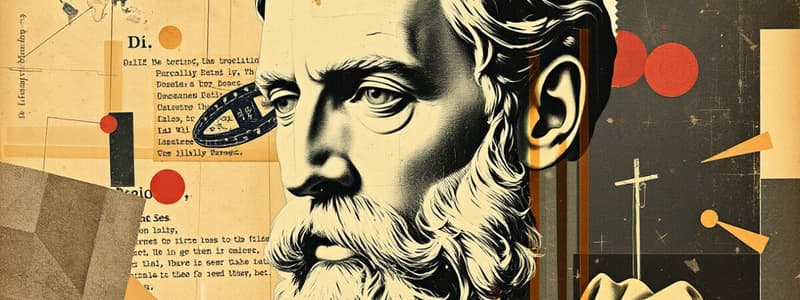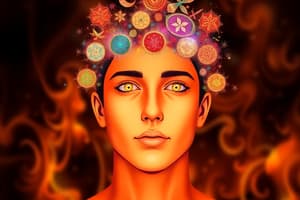Podcast
Questions and Answers
According to the division of reality established by Plato, what is the nature of the phenomena?
According to the division of reality established by Plato, what is the nature of the phenomena?
- It exists outside of time and space.
- It is the ultimate reality of existence.
- It reflects the higher realities in a flawed manner. (correct)
- It is perfect and unchanging.
What is the main belief of Socrates regarding material possessions?
What is the main belief of Socrates regarding material possessions?
- They cannot provide true happiness. (correct)
- They should be prioritized over philosophical pursuits.
- They dictate the moral fabric of society.
- They lead to true happiness.
What component of the soul is responsible for basic human desires and pleasure?
What component of the soul is responsible for basic human desires and pleasure?
- Rational
- Spirited
- Appetitive (correct)
- Divine
What did Thales of Miletus believe was the essence of all matter?
What did Thales of Miletus believe was the essence of all matter?
What was a central theme in St. Augustine's philosophy?
What was a central theme in St. Augustine's philosophy?
Which philosopher is known as the father of modern philosophy for promoting a new science based on observation and experiment?
Which philosopher is known as the father of modern philosophy for promoting a new science based on observation and experiment?
What does the term 'Cogito, ergo sum' mean?
What does the term 'Cogito, ergo sum' mean?
What concept describes the self as having both mental and physical components that function together?
What concept describes the self as having both mental and physical components that function together?
According to John Locke, what is the state of a person's mind at birth?
According to John Locke, what is the state of a person's mind at birth?
What does David Hume argue constitutes the self?
What does David Hume argue constitutes the self?
What role does Immanuel Kant attribute to the self in terms of organizing experiences?
What role does Immanuel Kant attribute to the self in terms of organizing experiences?
What does Freud suggest is crucial for a strong sense of self?
What does Freud suggest is crucial for a strong sense of self?
What are the two categories of experiences according to David Hume?
What are the two categories of experiences according to David Hume?
Flashcards are hidden until you start studying
Study Notes
Thales of Miletus
- Proposed water as the fundamental substance of all matter.
- Suggested the earth is flat.
Pythagoras of Samos
- Explored the fate of the soul after death, including concepts of reincarnation.
Socrates
- Laid the groundwork for systematic self-examination through the Socratic method.
- Believed knowing oneself is the philosopher's highest task.
- Argued that material wealth and power do not lead to true happiness.
- Sought universal truths and adhered to unchanging ideals of beauty, justice, bravery, and honesty.
- Advocated for the dualistic nature of humans, comprising both body and soul.
- Criticized societies neglecting philosophical inquiry as bound to suffer.
- Executed for charges of impiety and corrupting the youth of Athens.
Plato
- Socrates' student, who continued his mentor's philosophical legacy.
- Founded the Academy, an influential institution for learning.
Division of Reality
- IDEAL: Represents the perfect state of existence.
- PHENOMENA: The tangible, imperfect world reflecting this ideal.
Forms
- Concept that each entity in the world correlates to a higher, truer reality, asserting that "there is a Form for everything."
Components of the Soul
- APPETITIVE: Represents basic human desires and pleasures, reliant on satisfaction.
- RATIONAL: The reasoning component that governs thought and actions.
- SPIRITED: The emotional aspect that seeks honor, victory, and overcomes challenges.
St. Augustine
- Positioned God at the center of existence, advocating for spiritual alignment with divine teachings.
- Shared Plato's view on human duality, integrating it into Christian philosophy.
- Defined life's ultimate goal as achieving spiritual bliss with God.
René Descartes
- Regarded as the father of modern philosophy, emphasized observation and experimentation in science.
- Introduced the method of systematic doubt to assert knowledge.
Cogito, Ergo Sum
- "I think, therefore I am" highlights that the act of thinking confirms one's existence.
- Challenged traditional sources of knowledge: authority, senses, and reason, establishing self-existence as the sole certainty.
Dualism
- Suggested the existence of two distinct entities within the self: mental (mind) and physical (body).
John Locke
- Founded British empiricism, arguing for natural liberty and equality among people.
- Proposed that experience and sensation are fundamental to self-formation, leading to the concept of Tabula Rasa.
Tabula Rasa
- The notion that individuals are born as 'blank slates,' devoid of knowledge, with identity built through experiences.
David Hume
- Defined self as a collection of perceptions in constant change, rejecting the idea of a permanent entity beyond the physical body.
Categories of Experiences/Perceptions
- IMPRESSION: Core of thoughts, vivid and tangible based on direct experiences.
- IDEA: Faint recollections derived from past impressions, such as imagined feelings.
Immanuel Kant
- Expanded on the notion of self, asserting it synthesizes and organizes experiences, beyond mere perception.
Transcendental Apperception
- The mind’s ability to structure experiences generates a higher level of consciousness.
Sigmund Freud
- Emphasized the influence of past experiences on self-perception.
- Proposed that a strong ego enables self-awareness of individual needs within societal constraints.
- Identified three layers of self/personality, highlighting the complexity of human identity.
Studying That Suits You
Use AI to generate personalized quizzes and flashcards to suit your learning preferences.




